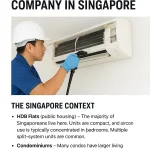Standard Aircon Chemical Cleaning Process in Singapore
Introduction
Singapore’s tropical climate makes air conditioning an essential part of everyday life. But with high humidity and daily usage, dirt, dust, and mold quickly accumulate inside aircon units. General servicing helps with surface cleaning, but when problems like weak airflow, foul odor, or leaks appear, a deeper solution is required—chemical cleaning.
Understanding the standard process of aircon chemical cleaning is important for homeowners and businesses. It helps you know what to expect from technicians, ensures you receive quality service, and protects you from paying for unnecessary add-ons.
Singapore Context
In Singapore, most households use split-unit systems in HDB flats and condominiums, while landed homes and commercial spaces often have larger, more complex systems. Because aircons run almost daily, regular cleaning (every 3 months) is recommended. However, chemical cleaning is typically needed every 6–12 months for deeper maintenance.
Tenancy agreements often require quarterly servicing, and some even specify chemical cleaning before handover. Commercial operators—especially F&B outlets—may need chemical cleaning more frequently due to stricter hygiene standards.
Why Chemical Cleaning Matters
Chemical cleaning goes beyond standard servicing. It targets:
- Mold and bacteria in hidden parts
- Deep dirt and grease stuck on the evaporator coil
- Blockages in drainage pipes causing leaks
- Stubborn odors that filters alone cannot fix
By dismantling and treating parts with chemical solutions, the process restores cooling efficiency, improves indoor air quality, and extends system lifespan.
Standard Process: Step by Step
When done properly, professional chemical cleaning in Singapore follows a structured workflow:
1. Inspection & Power Shut-Off
Technicians begin by inspecting the unit and switching off the power supply for safety.
2. Dismantling Components
The front cover, air filters, fan blower, and sometimes the evaporator coil are removed. For a chemical overhaul, the unit is fully dismantled.
3. Chemical Application
Specialized chemical solutions are applied to:
- Evaporator coil (to dissolve dirt, mold, and biofilm)
- Fan blower (to remove dust and grease)
- Drainage system (to clear blockages and mold)
4. Thorough Flushing
After chemical treatment, components are flushed with water to remove residues. This step is crucial to prevent chemical traces from affecting performance or causing corrosion.
5. Cleaning External Housing
The casing and outer surfaces are wiped and disinfected for a refreshed finish.
6. Reassembly
All dismantled parts are carefully reinstalled, ensuring proper alignment and secure fitting.
7. System Testing
The unit is switched back on, and technicians test:
- Airflow strength
- Cooling performance
- Refrigerant gas pressure
- Drainage function (to confirm no leaks)
Chemical Wash vs Chemical Overhaul
- Chemical Wash: Involves partial dismantling and spraying chemical solutions directly onto parts. Suitable for moderately dirty units.
- Chemical Overhaul: Full dismantling of the unit, with each component individually treated and flushed. Recommended for severely clogged or leaking systems.
- DIY: Homeowners can wash filters and wipe covers but should avoid chemical cleaning. The process involves dismantling and handling strong solutions that can damage parts if misused.
- Professional: Trained technicians ensure safety, use the right chemical concentrations, and test the system afterward. This guarantees both cleanliness and performance.
Signs You Need Chemical Cleaning
- Persistent moldy or musty smell
- Noticeable reduction in cooling performance
- Water leakage from indoor unit
- Loud noises during operation
- Airflow feels weak despite high fan setting
Health & Efficiency Benefits
A proper chemical cleaning delivers multiple benefits:
- Eliminates mold and bacteria, improving indoor air quality
- Reduces allergy triggers like dust mites and spores
- Improves cooling efficiency, lowering electricity bills
- Prevents costly repairs by keeping parts in good condition
- Extends the overall lifespan of your aircon system
Cost in Singapore
On average, chemical cleaning prices are:
- Chemical wash (non-overhaul): SGD 80–120 per unit
- Chemical overhaul: SGD 130–180 per unit
- Cassette/ceiling units: SGD 150–250 per unit
Bundled packages for multiple units usually reduce the per-unit cost.
Key Takeaways
- Chemical cleaning is more thorough than general servicing
- A proper process includes dismantling, chemical treatment, flushing, and testing
- Frequency: every 6–12 months for households, more often for commercial spaces
- Fair pricing in Singapore: SGD 80–180 depending on unit type and service level
1. How long does chemical cleaning take?
Usually 45–90 minutes per unit, depending on complexity.
2. Will the chemicals damage my aircon?
No, if applied and flushed correctly by professionals.
3. Can I skip chemical cleaning if I do regular servicing?
Not indefinitely. Regular cleaning helps, but deep chemical treatment is needed to remove hidden mold and dirt.
4. Is overhaul always necessary?
No, only when the unit is heavily clogged, leaking, or losing efficiency.
5. Do all service companies follow the same process?
Reputable ones do. Always confirm that dismantling, flushing, and testing are included in the price.
Conclusion
The standard process of aircon chemical cleaning in Singapore involves careful dismantling, chemical treatment, flushing, reassembly, and final testing. When performed correctly, it restores performance, improves air quality, and prolongs your aircon’s lifespan.
For reliable servicing that follows industry standards, you can turn to trusted providers like ACX.WORKS. Whether it’s a basic wash or a full overhaul, professional Aircon Cleaning ensures your cooling system remains efficient in Singapore’s challenging climate.


